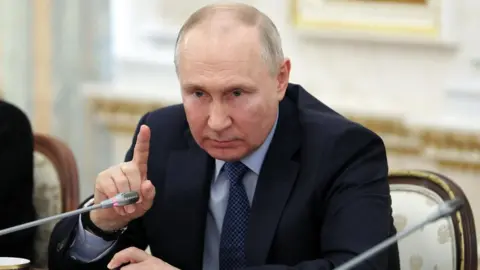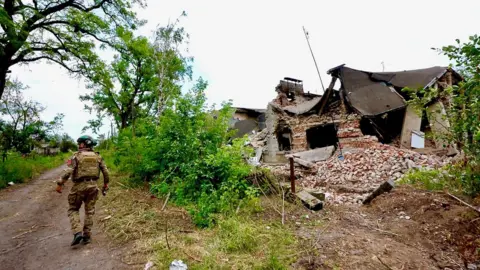Could Russia really play nuclear roulette in Ukraine?
 EPA
EPAIt's the question we've been asking ever since President Vladimir Putin ordered the full-scale Russian invasion of Ukraine. In this war, would the Kremlin go nuclear?
President Joe Biden isn't ruling it out.
"I worry about Putin using tactical nuclear weapons," the US president said this week. He believes the danger is "real".
I don't know whether President Biden reads the Russian magazine Profile. If he does, you can understand why he's worried.
Last week, Profile published an article by prominent Russian foreign and defence policy expert Sergei Karaganov. The hawkish Mr Karaganov is honorary chairman of the Presidium of the Council on Foreign and Defence Policy. In short, he's well-connected to those in power here.
His argument goes like this. In order to "break the West's will", Russia "will have to make nuclear deterrence a convincing argument again by lowering the threshold for the use of nuclear weapons".
"The enemy must know that we are ready to deliver a pre-emptive strike in retaliation for all of its current and past acts of aggression in order to prevent a slide into global thermonuclear war.
"But what if they do not back down? In this case, we will have to hit a bunch of targets in a number of countries in order to bring those who have lost their mind to reason."
Since last year, we've grown used to nuclear sabre-rattling from Moscow.
And President Putin has confirmed that Russia has already stationed a first batch of tactical nuclear weapons in Belarus, a move the Russian leader says is designed to remind anyone "thinking of inflicting a strategic defeat on us".
But arguing the pluses of a pre-emptive nuclear strike on the West? That's a whole new level.
Clearly, not everyone in Russia is on board with such an idea.
Today's edition of the business daily Kommersant features an article entitled "Nuclear War is a bad way of resolving problems".
 BBC/Darren Conway
BBC/Darren ConwayUnderstatement of all time, maybe. But what's fascinating about this piece is that it suggests the debate in Russia about when or whether to use nuclear weapons in the war in Ukraine has burst into the public domain. And the hawks don't have it all their way.
Penned by another group of Moscow-based foreign and defence policy experts, the Kommersant article explains why they believe Sergei Karaganov has got it wrong. Dangerously wrong.
"The idea that the use of nuclear weapons can halt escalation and resolve strategic problems that conventional military means have failed to is extremely dubious and, most likely, mistaken," write Alexei Arbatov, Konstantin Bogdanov and Dmitry Stefanovich from the Centre for International Security - part of a think tank within the Russian Academy of Science.
"In modern history, there are many examples of military operations leading to unforeseen consequences. But these were without nuclear weapons being used. A nuclear strike would raise the conflict to a whole new level of unpredictability and raise the stakes of confrontation many times over.
"The radioactive ruins that playing 'nuclear roulette' would most likely lead to are the worst foundation for a bright future. Fans of sensationalist ideas and dangerous gambling would be best to remember that."
Which brings us to another question we've been asking since the start of Russia's war in Ukraine: what on Earth is going on?
It's possible that Mr Karaganov's proposal for a pre-emptive nuclear strike was so shocking that other Russian academics felt they just couldn't stay silent.
If so, it shows that although the Russian media landscape is now heavily controlled by the state, even within current confines, there is still room on some platforms for limited debate and discussion on certain topics. Especially such crucial topics as nuclear war.
Or it may be that this whole debate is designed to grab the West's attention, to make President Putin look like good cop to Mr Karaganov's bad cop.
After all, the Kremlin leader himself hasn't called for a pre-emptive nuclear strike on the West. And so - the argument goes - better sit down and make peace with him, before hardliner Karaganovites win the day and press the nuclear button.
One thing's clear: with anti-Western rhetoric in Russia rising, and with the Ukrainian army's counter-offensive under way, the nuclear question isn't going away.
